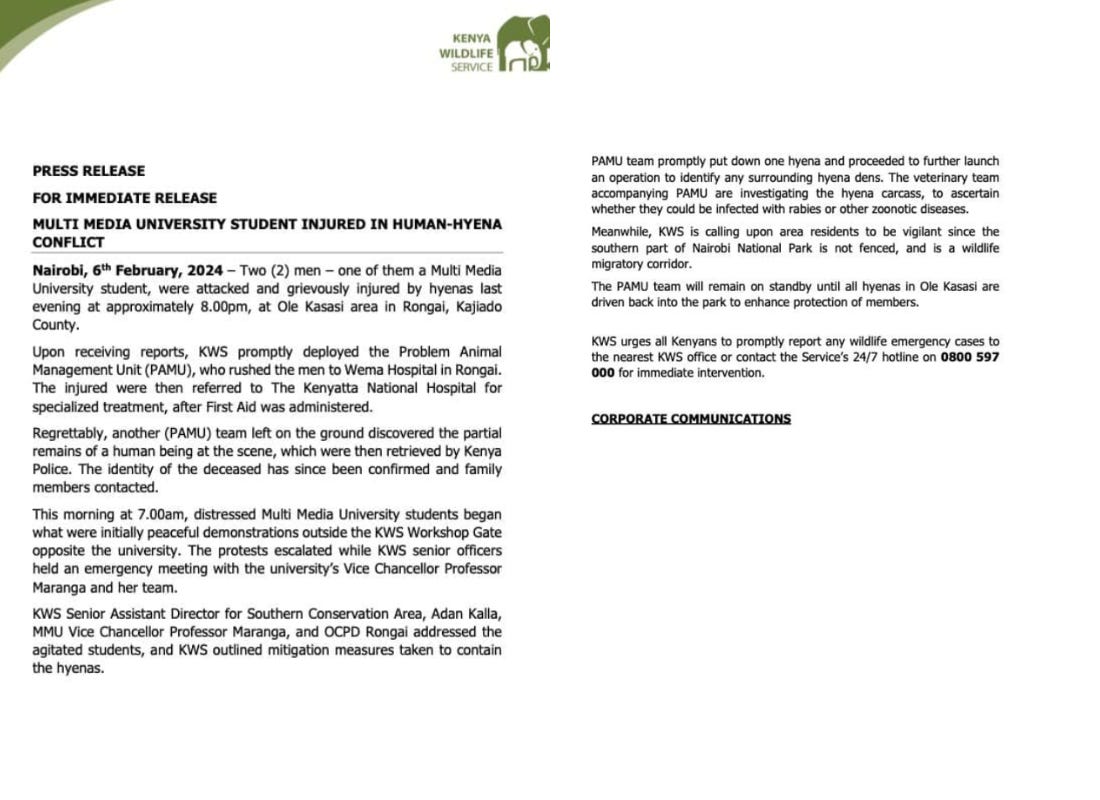On February 6, the Kenya Wildlife Service (KWS) reported two men, including a Multimedia University student, were attacked by hyenas late February 5 on a road that borders the Nairobi National Park near the capital of Nairobi.
A third case’s partial remains were also discovered at the scene.
KWS said it dispatched a team from its veterinary officers and Capture Services assisted by the Problem Animal Management Unit to capture hyenas that had inhabited caves within the Juja area.
“A report of a hyena having attacked a student of Multimedia University at Maasai Lodge area of Rongai on February 5, 2024, was responded to and samples collected from the hyena were taken to the National Veterinary Reference Laboratories (NVRL), Kabete for rabies test,” said a statement from KWS.
The test results from this case were confirmed to be positive for rabies on February 8, 2024.
Additional hyena on human attacks were reported in the days to follow. The captured hyenas were also rabies positive.
KWS said confirmation of rabies in the hyenas explains the unusual aggressive behavior towards people that was witnessed in Juja and Kajiado.
“The general public in the affected localities, in particular, are advised to exercise caution as they go about their daily activities as the necessary measures are put in place to manage the situation,” said KWS.
Hyena attacks have become increasingly frequent on the outskirts of Nairobi, prompting KWS to release guidelines on how to react when confronted by the animals. "If faced with a hyena, do not move away until it does and continue facing its direction. Be loud, look aggressive, and appear frightening to deter the hyena," the KWS advises.
Officials say 98 percent of rabies in East Africa is transmitted by domestic dogs and the role of spread in wildlife has not been documented.
On Thursday, a rabies mass vaccination of dogs began.
Yesterday, KWS posted on social media:
Kenya Wildlife Service remains committed to promoting peaceful coexistence between communities and wildlife.
Confirmation of rabies in the hyenas shed light on the unusual aggressive behavior observed in Juja and Kajiado, prompting Kenya Wildlife Service to swiftly implement control measures.
KWS initiated free dog vaccination programs in collaboration with the Directorate of Veterinary Services and County Governments of Kajiado and Kiambu.
The mass vaccination commenced on Thursday, February 15, 2024, in Ongata Rongai Division of Kajiado North Sub-County and Loosirkon Division in Kajiado East Sub-County.
KWS appeals to residents to participate actively by bringing their dogs for vaccination and the affected communities are urged to exercise caution in their daily activities.
Check out my World Rabie’s Day Livestream Special below:





